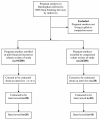The effectiveness of financial incentives for smoking cessation during pregnancy: is it from being paid or from the extra aid?
- PMID: 22471787
- PMCID: PMC3338379
- DOI: 10.1186/1471-2393-12-24
The effectiveness of financial incentives for smoking cessation during pregnancy: is it from being paid or from the extra aid?
Abstract
Background: Financial incentives appear to be effective in promoting smoking cessation in pregnancy. The mechanisms by which they might operate however, are poorly understood. The present study examines how financial incentives for smoking cessation during pregnancy may work, by exploring pregnant women’s experiences of trying to stop smoking, within and outside of a financial incentives scheme.
Methods: Thirty-six (n = 36) UK-based pregnant smokers (n = 36), offered standard NHS Stop-Smoking Services, of whom twenty (n = 20) were enrolled in a financial incentives scheme for smoking cessation (n = 20) and sixteen (n = 16) were not, were interviewed about (i) their motivation to stop smoking, and (ii) the factors they perceived as influencing their quitting efforts. Framework Analysis was used to analyse the data.
Results: Women in the two groups reported similar reasons for wanting to stop smoking during pregnancy. However, they described dissimilar experiences of the Stop-Smoking Services, which they perceived to have differentially influenced their quit attempts. Women who were incentivised reported using the services more than women who were not incentivised. In addition, they described the motivating experience of being monitored and receiving feedback on their progress. Non-incentivised women reported problems receiving the appropriate Nicotine Replacement Therapy, which they described as having a detrimental effect on their quitting efforts.
Conclusion: Women participating in a financial incentives scheme to stop smoking reported greater engagement with the Stop-Smoking Services, from which they described receiving more help in quitting than women who were not part of the scheme. These results highlight the complexity of financial incentives schemes and the intricacies surrounding the ways in which they operate to affect smoking cessation. These might involve influencing individuals’ motivation and self-regulation, changing engagement with and provision of support services, or a combination of these.
References
Publication types
MeSH terms
Grants and funding
LinkOut - more resources
Full Text Sources
Medical


